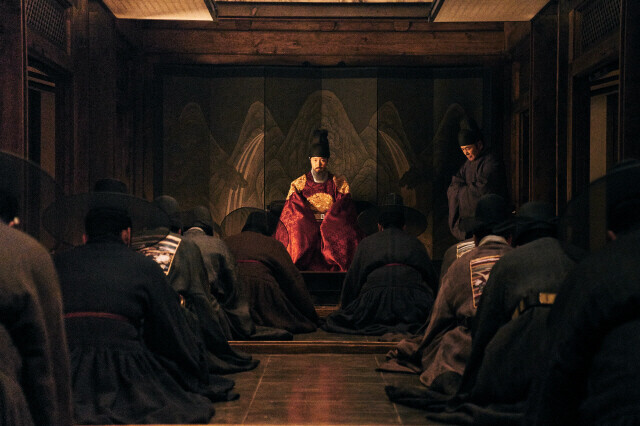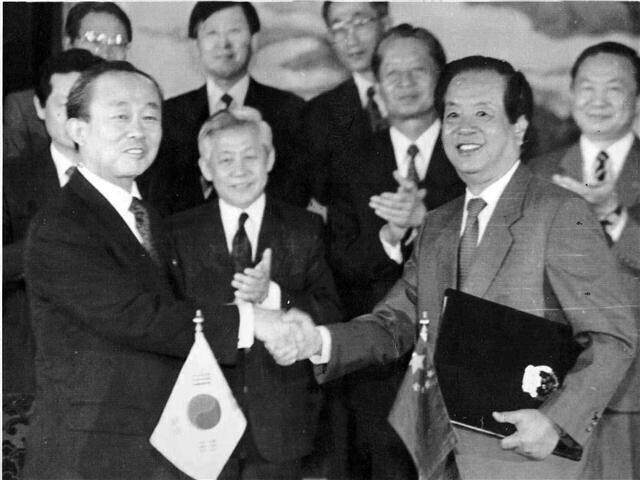hankyoreh
Links to other country sites 다른 나라 사이트 링크
[Column] Yoon’s haphazard diplomacy could spell calamity for Korea


By Park Min-hee, editorial writer
Given how long it has been closely connected with the empires of mainland China, how did the Korean Peninsula manage to avoid becoming part of China?
In his book “Empire and Righteous Nation: 600 Years of China-Korea Relations,” Yale University professor Odd Arne Westad cites knowledge and identity as two reasons for this. Members of the Joseon elite had a good enough understanding of the Ming and Qing empires that they were able to devise measures to remain independent from them. Also an important factor was the fact that the Korean Peninsula’s people had long maintained an identity distinct from China.
The “righteous nation” in Westad’s title refers to how the foundation of national identity for the people living on the Korean Peninsula lay in the concept of “righteousness,” which had manifested among the “righteous armies” fighting back against foreign powers.
For nearly all of its history, the Korean Peninsula maintained autonomy in its internal administration.
But whenever they entered into competition with other powers over dominance in East Asia, the empires of mainland China would seek to intervene on the peninsula both politically and militarily. Examples of this include the Ming military expedition around the time of the Imjin War, the 1636 Qing invasion of Joseon, the Imo incident in 1882, the Gapsin Coup in 1884, the First Sino-Japanese War, and the Korean War.
Westad, a historian who hails from Norway, is famous for his research into Chinese international relations and Cold War history in a way that focuses not on the perspectives of the major powers but on the people in other affected countries. He stresses that China’s influence on the Korean Peninsula has not been unilateral, and that the peninsula has also had a special impact on China.
This historical trend continues to apply in South Korea-China relations today, which have shown signs of souring as the 30th anniversary of their founding approaches. The relentless pressure that China has applied on South Korea due to the Terminal High Altitude Area Defense (THAAD) and Chip 4 alliance issues is based on its prediction that deployment of additional anti-missile batteries and participation in a semiconductor alliance will tip the strategic balance between the US and China much more in the former’s favor.
If South Korea decides to join the Quad in the future or to beef up its military cooperation with the US and Japan, China is likely to respond with harsh threats and retaliation on similar grounds.
In its diplomatic relations with South Korea, China places major importance on its rivalry with the US as a competition between “empires.” The more emphasis that Beijing places on a “great rejuvenation of the Chinese nation,” and the more it takes on the imperial characteristics of expansion and hierarchy, the more China will favor intensifying its influence over the Korean Peninsula, which it views as part of its traditional sphere of influence.
The Taiwan issue is also likely to have potentially dangerous repercussions for South Korea-China relations. While the Chinese leadership has always regarded reunification with Taiwan as its goal, it also realized major achievements in the meantime with the establishment of the People’s Republic in the Mao Zedong era and economic growth under leaders Deng Xiaoping and Hu Jintao.
China may be a major power now, but its era of supercharged growth is coming to an end, and inequality and population decline are only getting worse. In that sense, achieving reunification with Taiwan is a kind of core pledge underpinning the legitimacy of President Xi Jinping’s rule.
China is also incomparably more powerful militarily than it was in the past. Having used US Speaker of the House Nancy Pelosi’s recent visit to Taiwan as a pretext for embarking on military exercises encircling the island on all sides, China is very likely to continue “containing” it and applying military pressure with drills that are tantamount to preparations for a Taiwan invasion. In South Korea’s case, it is likely to turn up the pressure on Seoul to recognize Taiwan issues as China’s own “internal affairs.”
As South Korea is forced to make a choice between the US and China on matters like these, the decisions it makes will have a major impact not just on its own future but on the global order.
After properly ascertaining the meaning and repercussions of each issue and deciding on a set of clear principles, Korea must not be easily shaken by pressure and threats from either side. That is the only way to reduce the pressure from superpowers that seek to push Korea around.
In a survey conducted by Pew Research this year, 80% of Koreans expressed unfavorable views toward China, with “China’s involvement in domestic politics” cited as a very serious concern (54%). This can be interpreted as public concern that China is attempting to treat Korea as part of a ruler-subject relationship.

It is imperative that Korea prepares fastidiously for a period of transition. The curtain is falling on the era marked by a symbiotic economic relationship between Korea and China in which the former exports components and intermediary goods and the latter produces finished products for global export. This is a result of China’s policy orientation toward technological development and self-sufficiency and major reshuffling of the global supply chain.
As North Korea, China and Russia engage in closer mutual collaboration, it will become increasingly difficult to look to China for meaningful cooperation on solving the North Korean nuclear and missile issues. Korea must curtail its excessive reliance on China’s markets and raw materials while quietly but delicately advancing a consistent policy of upholding peace while preparing to resume talks.
The confusion that arose in the process of President Yoon Suk-yeol speaking to US House Speaker Pelosi by phone instead of meeting her in person following her visit to Taiwan is also becoming the subject of international ridicule. Even if this was a diplomatic move that was mindful of provoking China, the release of photographs of Yoon attending a play and its wrap party the night before and the presidential office’s contradictory statements on whether to receive Pelosi naturally led to doubts over whether the “diplomatic control tower” was working as it should.
And although Prime Minister Han Duck-soo recently proclaimed that the Chinese economy is “almost headed toward a profligate level,” many are concerned about a lack of economic preparation in the event that Sino-Korean relations go south.
The current fluctuations in the international order can be compared to the transition period between the Ming and Qing dynasties. At the time, the incompetent diplomacy of King Injo of Korea remained tied up in loyalty to Ming, inciting the calamity of the second Manchu invasion of Korea. The king ultimately suffered the humiliation of being forced to bow before Hong Taiji of the Qing dynasty.
In “Review of Hong Taiji’s War: Qing Invasion of Joseon Korea in 1637,” a comprehensive study that even looked at Manchu materials, Seoul National University professor Koo Bum-jin tells a slightly different story. Although the Joseon royal court had gained some intelligence on the impending Qing invasion the night before and prepared a defense strategy for a war of attrition, Hong Taiji, who viewed the subjugation of Joseon as a key pretext for his ascent to the emperor’s throne, directly commanded the Qing army to advance at rapid speed, catching Joseon off-guard. This made it difficult for the Korean Peninsula to respond to the mainland empire.
President Yoon’s diplomacy is making a lot of noise but lacks policies or principles, rendering it even more irresponsible than King Injo and a definite cause for concern.
Please direct questions or comments to [english@hani.co.kr]

Editorial・opinion
![[Guest essay] Amending the Constitution is Yoon’s key to leaving office in public’s good graces [Guest essay] Amending the Constitution is Yoon’s key to leaving office in public’s good graces](https://flexible.img.hani.co.kr/flexible/normal/500/300/imgdb/original/2024/0416/8917132552387962.jpg) [Guest essay] Amending the Constitution is Yoon’s key to leaving office in public’s good graces
[Guest essay] Amending the Constitution is Yoon’s key to leaving office in public’s good graces![[Editorial] 10 years on, lessons of Sewol tragedy must never be forgotten [Editorial] 10 years on, lessons of Sewol tragedy must never be forgotten](https://flexible.img.hani.co.kr/flexible/normal/500/300/imgdb/original/2024/0416/8317132536568958.jpg) [Editorial] 10 years on, lessons of Sewol tragedy must never be forgotten
[Editorial] 10 years on, lessons of Sewol tragedy must never be forgotten- [Column] A death blow to Korea’s prosecutor politics
- [Correspondent’s column] The US and the end of Japanese pacifism
- [Guest essay] How Korea turned its trainee doctors into monsters
- [Guest essay] As someone who helped forge Seoul-Moscow ties, their status today troubles me
- [Editorial] Koreans sent a loud and clear message to Yoon
- [Column] In Korea’s midterm elections, it’s time for accountability
- [Guest essay] At only 26, I’ve seen 4 wars in my home of Gaza
- [Column] Syngman Rhee’s bloody legacy in Jeju
Most viewed articles
- 1[Guest essay] How Korea turned its trainee doctors into monsters
- 2[Column] A death blow to Korea’s prosecutor politics
- 3[News analysis] Watershed augmentation of US-Japan alliance to put Korea’s diplomacy to the test
- 4‘National emergency’: Why Korean voters handed 192 seats to opposition parties
- 5[Photo] Cho Kuk and company march on prosecutors’ office for probe into first lady
- 6Exchange rate, oil prices, inflation: Can Korea overcome an economic triple whammy?
- 7After Iran’s attack, can the US stop Israel from starting a regional war?
- 8US grants Samsung up to $6.4B in subsidies for its chip investments there
- 9[Guest essay] Amending the Constitution is Yoon’s key to leaving office in public’s good graces
- 10Student made first call for rescue from sinking Sewol ferry